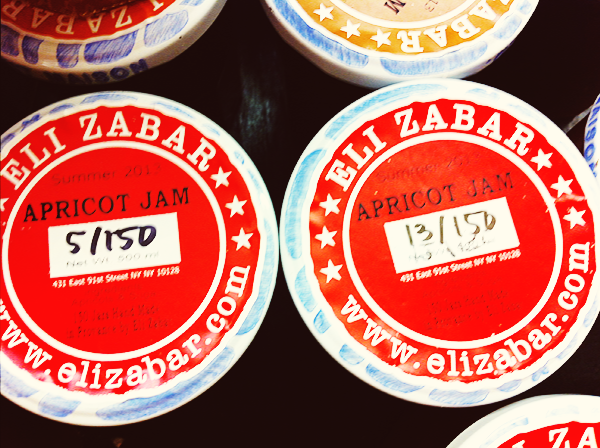
Let’s say you love apricot jam more than any other flavored jam in the world. Let’s also say you could buy a limited-edition jar of apricot jam, handmade by a guy named Eli Zabar, in his very own kitchen in Provence, France (he whipped up 150 jars, kind of like a limited-edition Picasso lithograph.)
What would you pay for this extra special apricot jam? After all, this isn’t just a common jar of Smucker’s jam you can buy in the supermarket. Eli Zabar caressed those apricots with his bare hands, and in France, no less. (In case you’ve never heard of Eli Zabar, he’s owns a bread business and a few gourmet groceries, take-out shops and restaurants in Manhattan.)
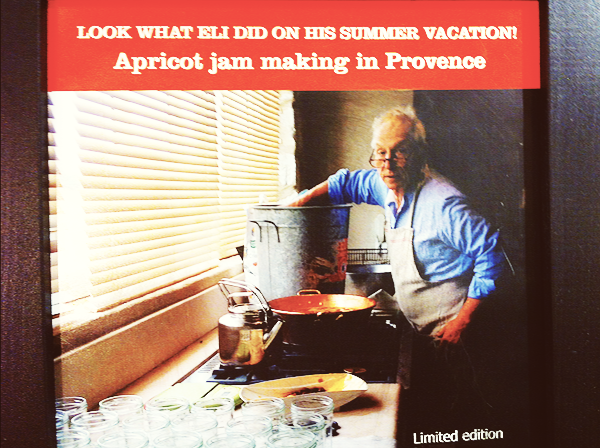
Would you pay $15? $20? $22.50? $31? $35? $41?
How about $45?
Ridiculous, you say? Insanely ridiculous, I say.
Just for fun, I decided to look up a recipe for homemade apricot jam to see how complicated it is. I’ve never made jam in my life but I thought I might try a recipe on David Lebovitz’s website, especially because he lives in France. Look right below to see how simple it is.
David’s “unofficial survey” reveals that homemade apricot jam gets the most people excited in France, where fresh apricots are plentiful and inexpensive in the summer. He says the jam is “incredibly easy to make, and the tartness provides a fruity tang which is a rather pleasant thing to wake up to in the morning.” Although David doesn’t add other fruits, berries or spices to the jam, he sometimes adds some vanilla bean paste.
David Lebovitz’s Apricot Jam
3-4 Jars
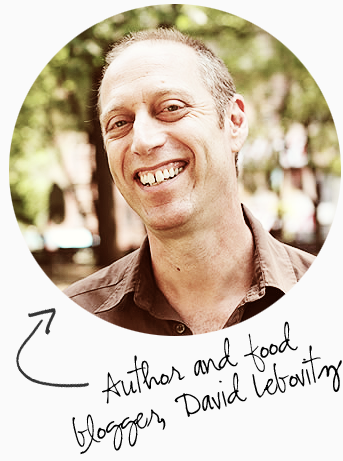
David likes his jam on the tart side, he says on his website. “The amount of sugar shown is based on how much apricot puree I got from this particular batch of apricots,” he explains. “Because fruit doesn’t grow in standardized quantities (at least the fruit I want to eat) my general rule is to use three-quarters of the amount of sugar per one-part apricot puree. So if you use more, or less, apricots, simply use for each cup of puree, by volume, three-quarters cup of sugar.
“Apricots become quite tangy once cooked, so you’ll find this is not very sweet. I don’t recommend using less sugar, since it may not jell correctly. A bit of lemon juice added at the end provides additional balance, and Europeans often crack a few apricot kernels open and add one to each jar before pouring in the jam, which isn’t meant to be eaten, but gives the jam a subtle, bitter almond-like flavor.”
2¼ pounds fresh apricots
¼ cup water
3 cups sugar
1 teaspoon freshly squeezed lemon juice
Optional: 1 teaspoon kirsch
- Cut the apricots in half and extract the pits. If you wish, crack a few open and put a kernel in each jam jar you plan to fill.
- Place the apricots in a stockpot or Dutch oven, and add the water. Cover the pot and cook, stirring frequently, until the apricots are tender and cooked through.
- Put a small plate in the freezer.
- Add the sugar to the apricots and cook, uncovered, skimming off any foam that rises to the surface. As the mixture thickens and reduces, stir frequently to make sure the jam isn’t burning on the bottom.
- When the jam looks thick and is looks slightly jelled, turn off the heat and put a small amount of jam on the chilled plate. Put back in the freezer for a few minutes, then do the nudge test: If the jam mounds and wrinkles, it’s done. If not, continue to cook then re-test the jam until it reaches that consistency.
(You can use a candy thermometer if you wish. The finished jam will be about 220ºF, 104ºC.) - Once done, stir in the lemon juice and kirsch, if using, and ladle the jam into clean jars. Cover tightly and let cool to room temperature. Once cool, refrigerate until ready to use.
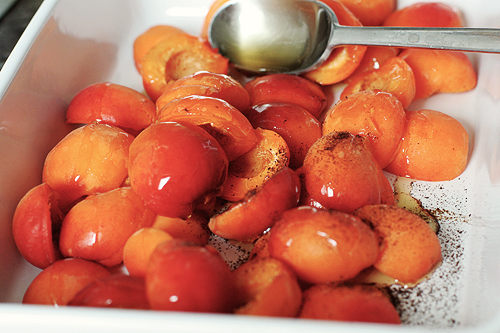
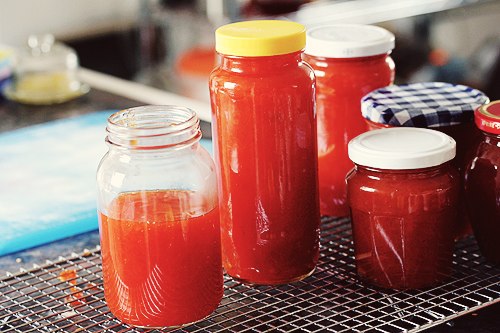
Storage: I find this jam will keep up to one year if refrigerated. If you wish to can it for long-term preservation, you can refer to the USDA Canning Guidelines for techniques.
Cost for ingredients:
2.25 pounds of apricots @ $3 a pound = $6.75
3 cups of sugar (1.5 pounds) @ $3 a pound = $4.50
Therefore, the sugar and apricots together would cost about $11.25 or $2.81 per jar.
Now I understand why Eli Zabar is so rich. His markup on jam is 1500 percent and I’m sure there were at least 150 crazy New Yorkers who bought it!

